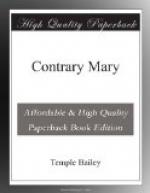“I reckon I’ve got somethin’ else to do beside make gardens,” drawled the man.
“What have you got to do that’s better?” Roger demanded.
The man hesitated and Roger pressed his point. “Flowers for the children—crops for men—I’ll wager you’ve a lot of land and don’t know what to do with it. Let’s try to make things grow.”
“Us? You mean you and me, parson?”
“Yes. And while we plant and sow, we’ll talk about the state of your soul.” Roger reached out his hand to the lean and lank sinner.
And the lean and lank sinner took it, with something beginning to glow in the back of his eyes.
“I reckon I ain’t got on to your scheme of salvation,” he remarked shrewdly, “but somehow I have a feelin’ that I ain’t goin’ to git through those days of plantin’ crops with you without your plantin’ somethin’ in me that’s bound to grow.”
In such ways did Roger meet men, women and children, reaching out from his loneliness to their need, giving much and receiving more.
It was on Tuesday morning that he came back finally to the house which seemed empty because of Cousin Patty’s absence. The little lady was still in Washington, whence she had written hurried notes, promising more when the rush was over.
At the gate he met the rural carrier, who gave him the letters. There was one on top from Mary Ballard.
Roger tore it open and read it, as he walked toward the house. It contained only a scribbled line—but it set his pulses bounding.
“DEAR ROGER POOLE:
“I want to be friends again. Such friends as we were in the Tower Rooms. I know I don’t deserve it—but—please.
“MARY BALLARD.”
It seemed to him, as he finished it that all the world was singing, not merely the mocking-birds in the magnolias, but the whole incomparable chorus of the universe. It seemed an astounding thing that she should have written thus to him. He had so adjusted himself to the fact of repeated disappointment, repeated failure, that he found it hard to believe that such happiness could be his. Yet she had written it; that she wanted to be—his friend.
At first his thoughts did not fly beyond friendship. But as he sat down on the porch steps to think it over he began, for the first time since he had known her, to dream of a life in which she should be more to him than friend.
And why not? Why shouldn’t he dream? Mary was not like other women. She looked above and beyond the little things. Might not a man offer her that which was finer than gold, greater than material success? Might not a man offer her a life which had to do with life and love—might he not share with her this opportunity to make this garden in the sand-hills bloom?
And now, while the mocking-birds sang madly, Roger Poole saw Mary—here beside him on the porch on a morning like this, with the lilacs waving perfumed plumes of mauve and white, with the birds flashing in blue and scarlet and gold from pine to magnolia, and from magnolia back to pine—with the sky unclouded, the air fresh and sweet.




